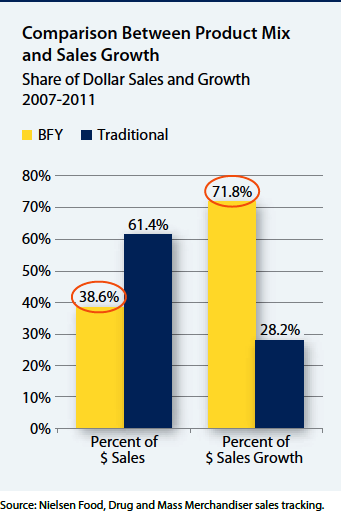This session is on Practicing Food Studies. It will be at 5;00 p.m. Details to come.
“Better-for-you” products better for food industry? Only if they can be marketed as such.
A study released yesterday reports that so-called “better-for-you” (BFY) foods (those low in salt and sugar, high in fiber or with added vitamins, for example) may account for only about 40% of company sales, but they account for more than 70% of growth in sales.
According to the press release accompanying the report, companies that sell BFY products “record stronger sales growth, higher operating profits, superior shareholder returns, and better company reputations than companies that sell fewer BFY products.”
The public health implications? According to the report:
- Placing more emphasis on selling BFY foods and beverages is an effective pathway to improved sales, profits, shareholder returns, and reputation.
- Proof that bottom lines can benefit when companies have a greater percentage of sales from BFY foods could accelerate progress toward the development and marketing of more nutritious foods.
- Public health officials and policymakers need to be aware of food and beverage companies’ core business goals in order to work effectively with them to address the obesity epidemic.
I emphasize the third one because it sounds so much like a veiled threat.
I think it means that if public health officials want the food industry to make healthier food products, they better let food companies market their products any way they like:
- To children with no restrictions
- Using cartoons on packages of products aimed at children
- Using health claims with no restrictions
- Using front-of-package labels that emphasize “good-for-you” nutrients
Or else.
Or else what? Just watch what the food industry will do (and is doing) whenever public health officials try to restrict advertising to children or demand that that companies put nutritional “negatives” on front-of-package labels.
Here’s CNN Health’s account (I’m quoted) and the one in the Wall Street Journal (I’m not).


